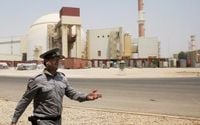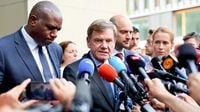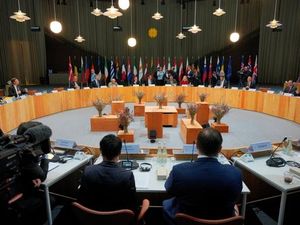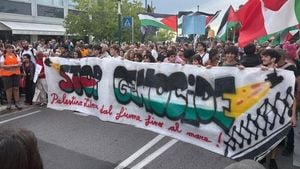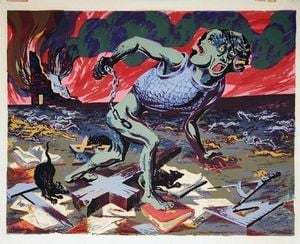On August 28, 2025, the diplomatic standoff over Iran’s nuclear program reached a dramatic new phase as France, Britain, and Germany—collectively known as the E3—triggered the United Nations’ snapback mechanism, setting in motion a 30-day countdown to reimpose sweeping sanctions on Tehran. The move, which comes after months of faltering negotiations and rising tensions, marks the most serious attempt in years to pressure Iran back into compliance with the 2015 nuclear agreement, a deal that has been teetering on the brink of collapse since the United States’ withdrawal in 2018.
According to Reuters and France 24, the E3 notified the U.N. Security Council that Iran was in “significant non-performance of its commitments” under the landmark deal, officially known as the Joint Comprehensive Plan of Action (JCPOA). This notification triggered the so-called ‘snapback’ mechanism, a rarely used process that automatically restores U.N. sanctions that were suspended a decade ago, unless the Security Council votes to block it—a highly unlikely outcome given the current international climate.
The timing of the E3’s decision is no accident. Just two months earlier, Israeli and U.S. forces bombed Iranian nuclear facilities, escalating fears that the diplomatic window was closing fast. European officials, as reported by The Arab Weekly, worried they would lose the legal prerogative to reinstate sanctions if they failed to act by mid-October, as the JCPOA’s sunset clauses approached. “The E3 is committed to using all available diplomatic tools to ensure that Iran never develops a nuclear weapon,” the trio wrote in a letter to the Security Council, seen by Reuters.
The response from Tehran was swift and defiant. Iranian Foreign Minister Abbas Araghchi denounced the snapback as “illegal and unjustified” and vowed to “respond appropriately to this illegal and unjustified action by the three European countries, in order to protect and guarantee its national rights and interests.” Araghchi, speaking to his French, British, and German counterparts, warned that Iran would not bow to pressure but left the door open for talks, saying, “The doors of diplomacy will never slam shut.” A senior Iranian official told Reuters, “This measure is an act against diplomacy, not an opportunity for it. Diplomacy with Europe will continue. Iran will not yield under pressure.”
Yet, the E3’s move was not an outright rejection of diplomacy. French Foreign Minister Jean-Noël Barrot, speaking on August 30, 2025, reiterated Paris’s commitment to talks, provided Tehran took “concrete steps immediately.” Barrot explained, “A 30-day period opens at the end of which sanctions can be applied. Then European sanctions could also be applied—unless of course Iran agrees within this 30-day period to take the actions which we have been very clearly asking of it. The door of diplomacy remains open.”
Similarly, UK Ambassador to the UN Barbara Woodward emphasized on August 29 that the E3’s offer to extend the deal and delay sanctions “remains on the table.” She noted, “Triggering the snapback mechanism does not mark the end of diplomacy. Our extension offer remains on the table.” EU foreign policy chief Kaja Kallas echoed this sentiment, telling reporters in Copenhagen, “We have 30 days to sort things out.”
Despite these overtures, Iran’s leadership remains deeply skeptical. Iranian Ambassador Amir-Saeid Iravani accused the E3 of “blackmailing” Tehran, calling their extension plan “full of unrealistic conditions” and “a hypocritical move.” He argued that the demands being made “should be the outcome of the negotiations, not the starting point, and they know these demands cannot be met.” Iran, he said, would prefer “a short, unconditional technical extension” of the U.N. resolution underpinning the 2015 deal.
The sense of urgency is heightened by the International Atomic Energy Agency’s (IAEA) recent findings. As reported by The Arab Weekly, Iran has been enriching uranium to 60% fissile purity—dangerously close to the 90% threshold needed for weapons—and, before the June airstrikes, had stockpiled enough material for six nuclear weapons if further refined. While the IAEA has yet to find credible evidence of a coordinated weapons program, it cannot guarantee the peaceful nature of Iran’s nuclear activities, especially given the restrictions on inspector access since the June attacks.
On the ground in Iran, the looming threat of new sanctions is fueling economic anxiety and political divisions. According to sources cited by The Times of Israel, hardliners in Tehran are pushing for confrontation and even withdrawal from the Nuclear Non-Proliferation Treaty (NPT), while moderates advocate for continued engagement with the West. The Iranian parliament has already begun drafting legislation to exit the NPT, with lawmaker Hossein-Ali Haji-Deligani warning, “These are the consequences of activating the snapback mechanism.”
Meanwhile, the specter of renewed sanctions is causing ripples across the international stage. Russia and China, both signatories to the original JCPOA and strategic allies of Tehran, have proposed extending the 2015 agreement for another six months to allow for further negotiations. Russia’s deputy ambassador to the UN, Dmitry Polyanskiy, told reporters, “The world is at a crossroads. One option is peace, diplomacy and goodwill... Another option is hardline diplomacy.” Moscow has also announced a meeting between President Vladimir Putin and his Iranian counterpart Masoud Pezeshkian in China, signaling a potential pivot in the diplomatic landscape.
The United States, for its part, has signaled cautious support for the E3’s actions. Secretary of State Marco Rubio, in a statement on August 28, said, “At the same time, the United States remains available for direct engagement with Iran—in furtherance of a peaceful, enduring resolution to the Iran nuclear issue. Snapback does not contradict our earnest readiness for diplomacy, it only enhances it.” Rubio urged Iran to “take the immediate steps necessary to ensure that their nation will never obtain a nuclear weapon; to walk the path of peace; and to, by extension, advance prosperity for the Iranian people.”
Yet, the path forward remains fraught with uncertainty. The UN Security Council was scheduled to meet behind closed doors on August 29 to discuss the sanctions process, but with Russia and China likely to oppose any measure that increases pressure on Tehran, the outcome is far from clear. The E3, meanwhile, has made it clear that if Iran fails to act by the end of September, both UN and European sanctions will snap back into place, targeting Iran’s financial, banking, hydrocarbon, and defense sectors.
As the 30-day clock ticks down, the world watches anxiously to see whether Tehran will seize the remaining diplomatic opportunity—or whether the standoff will spiral into a new era of confrontation, with consequences that could reverberate across the Middle East and beyond.
